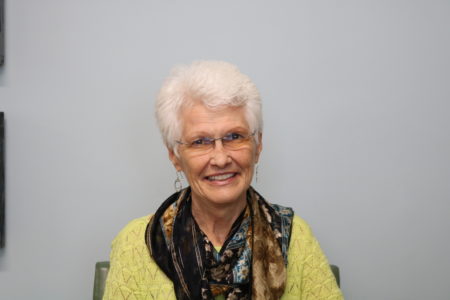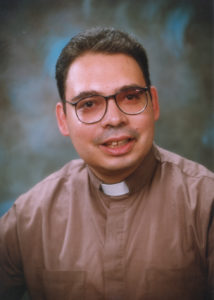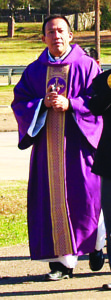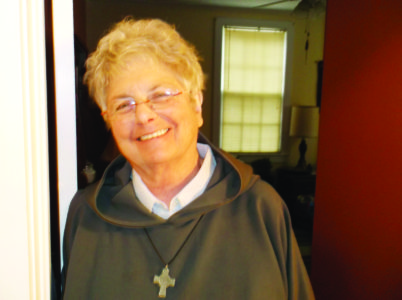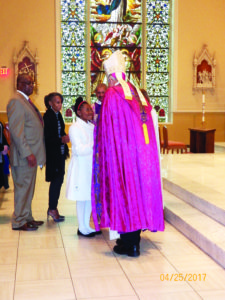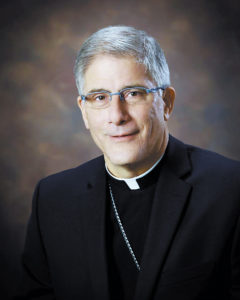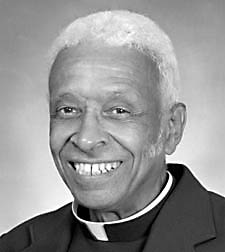
Father Jerome LeDoux, SVD
Reflections on Life
By Father Jerome LeDoux, SVD
Though the following thoughts seem only clerical in nature, they pertain to every human being. When taken into ourselves and absorbed as part of us, a column, sermon, task and all human endeavors take on a life to themselves, becoming as much a part of us as the air we breathe and the nourishment we ingest. While others must speak from their own unique experience, I personally find that I am not doing a thing right until I become totally immersed in the task at hand, so that it becomes an extension of me. That ipso facto elevates it to the wonderful nosebleed realm of meditation, creative imaginings and expectations.
So how about that? Whatever we do can become a special meditation, firing our juices of imagination, creativity and outreach to our sisters and brothers. Take a column, for example. Little seems to click or flow until something locks into my thoughts and feelings. Almost as if a switch were turned on, the things that I have been reading, the things that people have been saying and doing blend together.
Like the ingredients of a delicious meal or the components of an exquisite symphony, meditation combines everything into a fine creation and rendition. One knows whether a given column or talk will resonate with others by asking oneself, “Does it speak to me, resonate with me, move me to good and higher things? Does it ring a bell for me? That is what a preacher/speaker/writer wants to know at the zero hour. If it does, bells will be ringing for the audience at some level as well.
There are, of course, techniques for composing, writing, speaking formally or informally, making eye contact with each person in a small group or large crowd, convincing each person that you are addressing her or him alone, storytelling in a spellbinding way and interacting with audiences of many varieties and origins. All those things are wrapped up into one when they have become completely part of us. This is not a grandiose view of ourselves and our capabilities. It merely states that we are at our best and most convincing when we give what is uniquely ourselves.
Are these the mere ramblings of a weathered curmudgeon, or, we would hope, of a seasoned seeker hoping to become a savant with many treasure troves?
The latter is indeed what we hope for ourselves and for everyone else. Far from being mere ramblings, we would like to have all the reflections, meditations, imaginings and creations of each person grow out from the very Gospel of God that Romans 1:16 tells us “is the power of God unto salvation.”
This is a paradigm for the laity, for religious and clergy alike, for we all have very similar reactions to words, actions and challenges. Nevertheless, Saint Thomas Aquinas observes how individual we are, “Quidquid recipitur, ad modum recipientis recipitur.” “Whatever is received, is received according to the disposition of the recipient.” Who we are, what we are, how we are, is a composite that determines how we react to and interact with everyone and everything. We are all so very different and, notwithstanding, so very similar to each other. We are wonders, laughing at ourselves as we strive to be the top of the tip and the tip of the top.
No one comes to us, panting to watch us impersonate or imitate some great speaker, a scintillating performer, a wise counselor or engaging, livewire friend. Had people wanted that, they would have gone to check the great ones out. But no! What they come to see and hear are the low-level, everyday people that we are, in whose presence they have no fears or anxieties, they can drop all their defenses, they can let themselves go, they can laugh themselves silly, they can cry their hearts out, they can play the fool and be their little old selves without fear of criticism or rebuke.
Another variant of all this is expressed by Paul as he goes a step further in 1 Corinthians 10:31, “Whether you eat or drink, or whatever you do, do everything for the glory of God.” This involves a favorite theme of ours, the good intention, that turns all that we do into spiritual gold, silver and precious stones. Even as we are involved in turning a column, sermon or any kind of task or chore into a meditation, an intimate part of our very selves, we can crystallize all of it into a glorious offering to God by dedicating it to God in the morning and throughout the day.
I certainly hope this does not sound like complicated, convoluted ramblings. The last thing in the world that we need is more complications in our lives. Honestly, I believe that all these thoughts are easy to remember and understand because they are closely related and interlock with each other. Perhaps we can remember them most easily by saying, “In whatever you think, say or do, be all you can be.”
“God is love, and all who abide in love abide in God and God in them.” (1 John 4:16)
(Father Jerome LeDoux, SVD, has written “Reflections on Life since 1969.)


